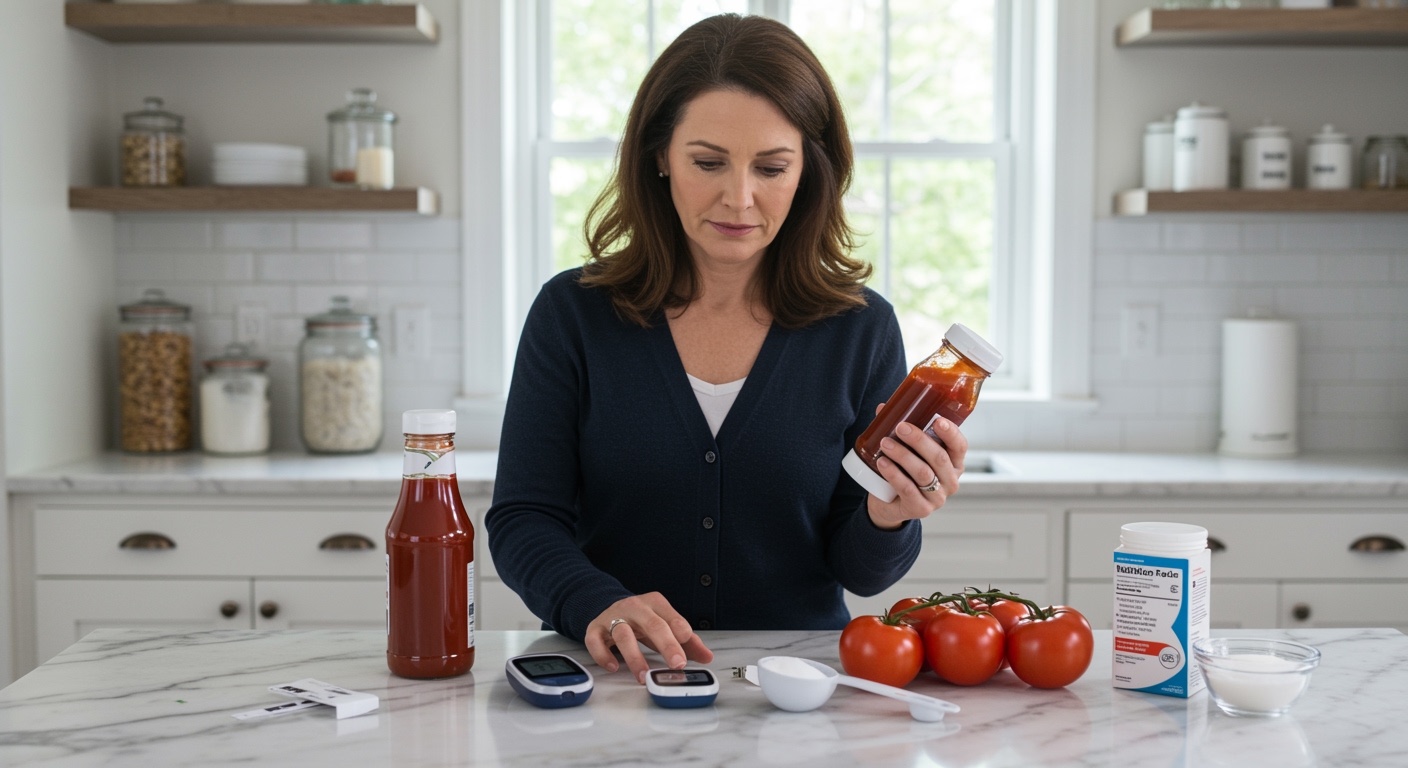✪ Key Takeaway: Ketchup can raise blood sugar due to added sugars, but small portions are manageable for most diabetics.
Introduction
You reach for that familiar red bottle to add flavor to your meal, but then you pause.
Maybe you have heard conflicting advice about ketchup and diabetes, or perhaps your doctor mentioned watching your condiment choices.
Hi, I am Abdur, your nutrition coach, and today I am going to explain exactly how ketchup affects your blood sugar and what you need to know to make informed choices.
What Makes Ketchup a Concern for Diabetics?
The main problem with ketchup lies in its sugar content and the type of sweeteners used.
Most commercial ketchup brands contain high fructose corn syrup or regular sugar as their second or third ingredient.
One tablespoon of regular ketchup contains about 4 grams of sugar, which equals roughly one teaspoon of added sugar.
This might not sound like much, but consider how much ketchup you actually use.
Most people use 2-3 tablespoons with their meals, which means they consume 8-12 grams of added sugar just from this condiment.
The glycemic index of ketchup ranges from 15 to 25, which is considered low to moderate.
However, the glycemic load becomes more concerning when you consider typical serving sizes and frequency of consumption.
✪ Fact: The average American consumes about 3 pounds of ketchup per year, mostly from restaurant meals.
How Does Ketchup Affect Your Blood Sugar?
When you consume ketchup, the added sugars enter your bloodstream relatively quickly.
High fructose corn syrup, the primary sweetener in most ketchup brands, gets processed differently than regular table sugar.
Your liver converts fructose directly into glucose, which can cause a more gradual but sustained rise in blood sugar levels.
The tomato base in ketchup does provide some fiber and nutrients, but the processing removes most of the beneficial compounds found in fresh tomatoes.
The acidic nature of ketchup can actually slow down gastric emptying slightly, which might help moderate the blood sugar spike.
However, this small benefit gets overshadowed by the sugar content when you consume larger portions.
Studies show that condiments with added sugars can contribute to postprandial hyperglycemia, which is the spike in blood sugar that occurs after eating.
✪ Pro Tip: Test your blood sugar 2 hours after eating meals with ketchup to understand your personal response.
Can You Include Ketchup in a Diabetic Diet?
The answer is yes, but with important portion control and smart choices.
A small amount of regular ketchup, about one tablespoon, can fit into most diabetic meal plans without causing significant blood sugar spikes.
The key is treating ketchup as part of your total carbohydrate budget for the meal, not as a free food.
Many people with diabetes successfully include small amounts of ketchup by adjusting other carbohydrates in their meal.
Sugar-free ketchup options are available and can be a better choice for people who want to enjoy the flavor without the blood sugar impact.
These alternatives use artificial sweeteners or natural sugar substitutes like stevia.
Reading ingredient labels becomes crucial because some “reduced sugar” products still contain significant amounts of added sugars.
✪ Note: Sugar-free ketchup may have a slightly different taste, but most people adapt to it within a few weeks.
What Are Better Alternatives to Regular Ketchup?
Several healthier alternatives can satisfy your craving for tangy, sweet flavors without the blood sugar concerns.
Homemade ketchup allows you to control the sugar content and use natural sweeteners like stevia or monk fruit.
Fresh salsa provides similar acidity and flavor with much less sugar and more beneficial nutrients from fresh vegetables.
Mustard contains virtually no sugar and can add tangy flavor to your meals without affecting blood glucose.
Hot sauce offers flavor enhancement with minimal carbohydrates, though you should check labels as some varieties contain added sugars.
Tomato paste mixed with vinegar and spices can create a ketchup-like flavor with better nutrient density and less added sugar.
Herb-based sauces like chimichurri or pesto provide rich flavors with healthy fats that can actually help stabilize blood sugar levels.
✪ Pro Tip: Make your own ketchup using tomato paste, apple cider vinegar, and stevia for a diabetes-friendly version.
How Much Ketchup Is Safe for Diabetics?
The safe amount depends on your individual blood sugar response and overall carbohydrate goals for the day.
Most diabetes educators recommend limiting regular ketchup to one tablespoon per meal as a starting point.
This portion contains about 4 grams of carbohydrates, which fits easily into most meal plans without causing significant issues.
People with well-controlled diabetes might tolerate slightly larger amounts, while those with unstable blood sugar should be more restrictive.
The timing of consumption matters too – having ketchup with a balanced meal that includes protein and fiber helps slow sugar absorption.
Avoid using ketchup as a standalone snack or with high-carbohydrate foods like french fries, as this combination can cause rapid blood glucose spikes.
Monitor your blood sugar response when you first reintroduce ketchup to understand your personal tolerance level.
✪ Fact: Restaurant ketchup packets typically contain about half a tablespoon, making portion control easier.
The Bottom Line
Ketchup is not completely off-limits for people with diabetes, but it requires mindful consumption and portion awareness.
Small amounts of pleasure foods can coexist with good health when you understand their impact and plan accordingly.
I would love to hear about your experiences with ketchup and diabetes management, or any questions you might have about making condiment choices that support your health goals.
References
At NutritionCrown, we use quality and credible sources to ensure our content is accurate and trustworthy. Below are the sources referenced in creating this article:
- PMC: Nutritional and Health Aspects of Food Products
- January AI: Ketchup Glycemic Index
- iHeald: Is Ketchup Bad for Diabetes
- Banner Health: Condiments and Spices for Diabetes





